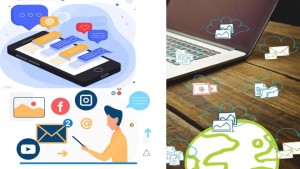
Outside the Inbox: Not-so-Correct Ways of Sharing Medical Data
Contents:
Introduction
Sharing Medical Data
Healthcare Professionals Going Rogue to Share Medical Data
- Mobile Messaging Apps
Social Media
Emailers
Professional Networking Groups/Platforms
Personal Cloud Storage
How Correct is the Practice of Sharing Medical Data Beyond Rules?
Potential Solutions
Anastomos—Your Guiding Platform
Introduction
The recent diversification in the 'sharing of data’ is a double-edged sword. While communication, connection, and coordination are important in all industries, they are governed by norms that must be strictly followed in healthcare. Failing this leads to serious consequences and threatens the security of patient data. Stay tuned as we discuss an unnoticed trend in healthcare—common yet not-so-correct methods of medical data sharing that are doing the rounds today.
Sharing Medical Data
Electronic Health Records (EHRs) are central to medical data-sharing rules and regulations. These diverse medical documents note all clinical interactions or events concerning a patient. With the advent of self-care and homecare technology, a steady stream of valuable healthcare data is being created round-the-clock. This demands a revision of all these policies to avoid the inadvertent sharing of sensitive medical data—especially for private practices and consultants.
Healthcare Professionals Going Rogue to Share Medical Data
Despite significant investments in electronic health record technology, fundamental problems with the seamless transmission of patient information persist. The need for effective communication transcends legislative boundaries as clinicians seek new alternatives to traditional EHR methods.
Healthcare professionals today use separate, social network-based channels, highlighting the critical need for effective data sharing to improve patient care in a rapidly changing healthcare landscape.
Mobile Messaging Apps
Healthcare professionals are turning to mobile messaging apps to share medical data securely. These apps provide a convenient and quick means of communication, allowing the exchange of critical patient information in real time.
Creating secure WhatsApp, Messenger, etc., groups to discuss patient cases, share updates, and exchange medical information is not subject to any rules.
Social Media
The usage of social media platforms for medical data exchange has become common in healthcare. These platforms provide a forum for collaborative discussions and information exchange. While they offer education and practical learning, protecting patient privacy and complying with ethical requirements may require strict vigilance.
Emailers
Emails are a popular, easy-to-use, and formal method for healthcare practitioners to communicate medical data. While emailers within a hospital community are within norms, outside this realm, the sharing of formal information needs clearance and permissions.
Professional Networking Groups/Platforms
Groups and communities on social media platforms have become an easy way to display and pass medical data in the form of photos, graphs, videos, and articles. While these are well-known strategies for professional display, education, and marketing, regulations monitoring such groups need strict vigilance.
Personal Cloud Storage
Healthcare workers are using personal cloud storage options to safely share medical data. This method provides flexibility and accessibility but deviates from the centralized norms of patient data storage and security.
How Correct is the Practice of Sharing Medical Data Beyond Rules?
The use of independent, doctor-to-doctor, social network-based channels for safe data exchange by physicians raises concerns about analogous scenarios in non-medical industries. You cannot imagine being legally barred from using email, SMS, etc., can you?
Potential Solutions
Here is a list of potential solutions that may help solve the matter.
A Better Understanding of Rules in Medical Data Sharing
Healthcare workers require comprehensive education and training programs to understand the legal and ethical responsibilities that come with sharing medical data. Creating a compliance culture through ongoing communication and training updates.
Broader EHR Controls
Investing in advanced electronic health record (EHR) systems that are interoperable allows for smooth data sharing inside an EHR framework that is unified and compliant. Integrating many data sources into EHR systems eliminates the need for external channels.
Strict Access Controls
By adopting role-based access restrictions, it is possible to limit data access to authorized personnel. Defining specific responsibilities and permissions inside the healthcare organization based on job duties is another good way to restrict the transfer of information.
Ethical and Secure Communication Platforms
Encourage the use of HIPAA-compliant communication channels designed specifically for healthcare.
Platforms should prioritize security features to protect patient data while communicating. Integrate encryption technology into communication systems to improve data security.
Legal Consequences
Explain the legal implications of illegally sharing medical data. Reiterating the possible consequences in terms of professional reputation, legal obligations, and regulatory penalties can significantly reduce the possibilities of inadvertent data sharing.
Anastomos—Your Guiding Platform
Anatomos is a value-added service that provides a full-spectrum, end-to-end solution for healthcare career development, providing comprehensive guidance in all aspects of healthcare practice. The theoretical and practical insights we incorporate into your everyday practice can be game-changers in the long run.
With us, you get to know the best practices and ethical advice related to sensitive areas of healthcare that often go unnoticed. Be it understanding compliance, legalities, or regulations, Anastomos can handhold you in keeping your professional career safe from unnecessary legal troubles. To learn more feel free to Sign up or log in. Write to us at [email protected] or call us at 9972541134 to get more information.

 News Feeds
News Feeds In News
In News Announcements
Announcements Blogs
Blogs Videos
Videos In & Around
In & Around  Pin Up
Pin Up  Open Source Directory
Open Source Directory